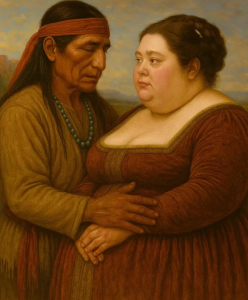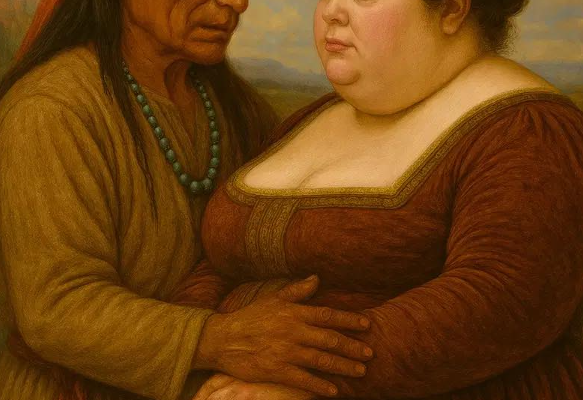
In the mid-1800s, when the Western territories were still wild and unforgiving, there lived a wealthy Spanish nobleman who ruled over vast lands stretching from the edge of Texas into what would later become New Mexico. His name was Don Esteban de la Cruz — a man of iron pride and cruel temper. He was known not only for his riches and influence but for his harsh discipline, especially toward his only daughter, Isadora.
Isadora was unlike the other young women of her class. While most noble daughters were trained in etiquette, elegance, and restraint, Isadora preferred solitude, art, and books. She was intelligent, tender-hearted, and full of compassion, yet she was constantly mocked by her father and the other nobles for one thing — her size. In a society that prized frailty and grace, Isadora’s fuller figure was seen as a flaw, and her father never let her forget it. He often told her she would never find a husband worthy of their family name.
When the Apaches began raiding the outskirts of Don Esteban’s lands, tensions grew between the settlers and the native tribes. To secure peace, Don Esteban arranged a meeting with an Apache leader, a fierce and respected warrior named Chayton. But the negotiations went badly — Don Esteban’s arrogance and insults sparked anger. The peace almost shattered until, in a desperate and prideful attempt to assert dominance, Don Esteban offered something shocking: his own daughter, Isadora, as a token of reconciliation.
He said it as punishment — both to humiliate her and to demonstrate that he could afford to “give away” even his own blood. The Apaches, though wary, accepted. Chayton saw in Isadora not a symbol of shame, but a living person — one who did not deserve such cruelty. When she was brought to the Apache camp, terrified and humiliated, Chayton looked her in the eyes and said softly, “You are not my prisoner. You are free here.”
At first, Isadora struggled to adapt. The vast desert, the open sky, the language and customs of her new surroundings — everything was strange. But the Apache women were kind. They showed her how to grind corn, how to weave baskets, and how to gather herbs. Slowly, she began to feel something she had never felt in her father’s grand estate: acceptance.
Chayton treated her with a quiet reverence. He never mocked her body or her softness. Instead, he admired her laughter, her curiosity, her bravery. When she told him about the books she used to read, he listened attentively, fascinated by her knowledge. In return, he taught her the songs of his people — the way the stars guided travelers, and how every living thing in the desert had a spirit.
One night, as they sat beside a fire under a blanket of stars, Chayton told her a legend — about a woman who carried the moon’s light within her and brought healing to wounded hearts. “I think you are that woman,” he said. She laughed, thinking he was teasing her, but his gaze was steady. From that night onward, something changed between them.
Months passed, and Isadora’s fear turned into affection. She realized that Chayton’s people respected her not for her beauty, but for her kindness. Her soft hands helped children, her laughter lifted spirits, and her gentle nature made her beloved in the tribe. Chayton began to court her in his people’s way — leaving small gifts at her tent: feathers, wildflowers, and painted stones.
When he finally asked her to be his wife, she wept with joy. For the first time in her life, she felt wanted — not for her father’s wealth or her family name, but for who she truly was. Their wedding was simple yet beautiful. The tribe danced beneath the stars, and Isadora’s heart was full.
But peace never lasts long in such times. Word spread that Don Esteban’s daughter had been “taken” by the Apaches, and her father, furious over the supposed insult to his honor, sent soldiers to retrieve her. When they found the camp, they attacked without warning. The Apaches fought bravely, but they were outnumbered.
Isadora ran to find Chayton in the chaos. She found him wounded but alive, defending their home. She threw herself in front of him, crying out to the soldiers to stop. Among them was one of her father’s men, who recognized her. “Señorita Isadora! We’ve come to save you!”
She shook her head. “You don’t understand,” she cried. “I am already home.”
The soldiers hesitated, but Don Esteban himself appeared soon after. He was shocked at the sight of his daughter dressed in Apache clothes, her hair braided, her face glowing with strength and purpose. “You shame our name,” he spat. “Come with me now, before I destroy this place.”
Isadora stood tall. “You already destroyed everything that mattered to me long ago,” she said. Then she turned to Chayton and took his hand. “I choose love, Father. I choose him.”
Enraged, Don Esteban raised his pistol. Before he could fire, one of his own soldiers — disgusted by his cruelty — intervened. A shot rang out, and the nobleman fell. The soldiers retreated, leaving the camp in stunned silence.
In the months that followed, Isadora and Chayton rebuilt their lives together. They planted new crops, raised children, and built bridges between settlers and tribes. Her story became a quiet legend — not of punishment or shame, but of transformation.
Years later, when travelers passed through the region, they sometimes spoke of a noblewoman who became a healer among the Apache — a woman with laughter like sunlight and eyes that carried both sorrow and peace.
They said her love had tamed even the wild desert winds.
And so, what began as a father’s cruel punishment became a tale of redemption — of a woman who lost everything only to find something greater: the kind of love that sees not the body, not the bloodline, but the soul.

